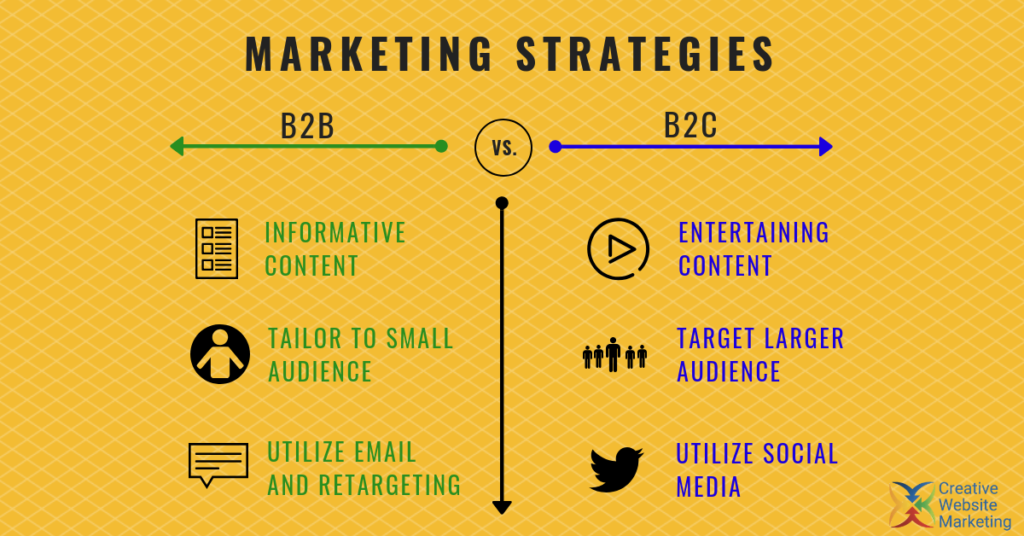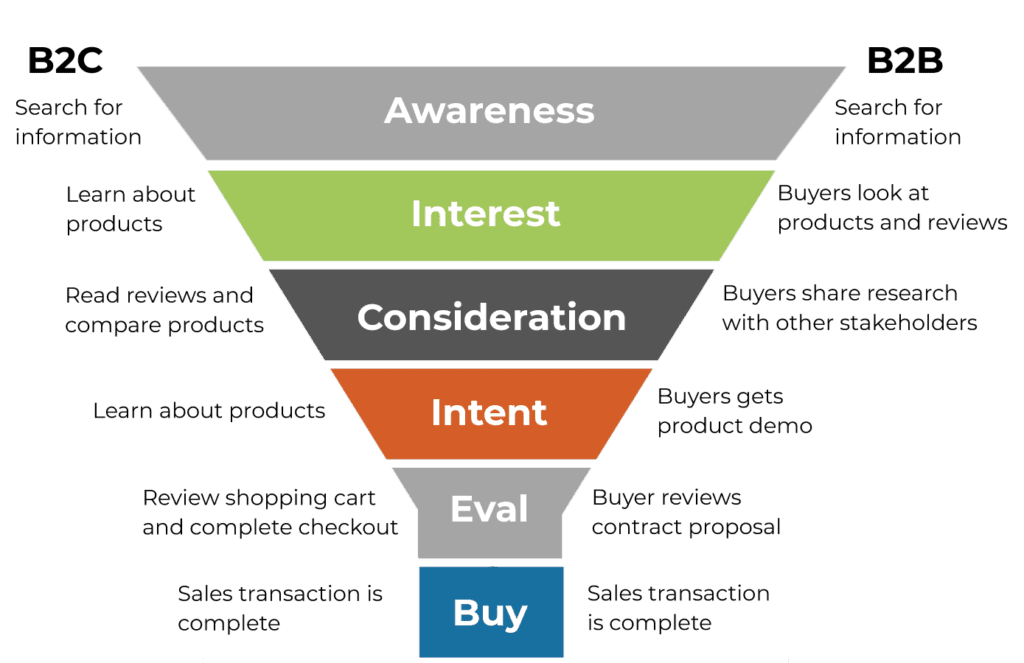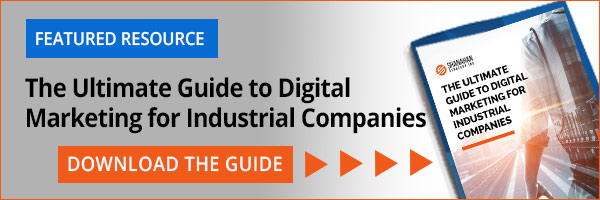B2B and B2C marketing strategies are similar in that they share a common endgame – generating and sustaining business. However, each often uses different processes tailored specifically to their target audiences via digital platforms.
While there are many digital marketing strategies available to both structures, here we will discuss five each for B2B and B2C businesses.

Key Takeaways
- “Digital marketing” includes all online activities that market products and services.
- While B2B and B2C marketing strategies share the common goal of attracting new customers, they employ different strategies and target different prospects.
- Many analysts believe inbound marketing is the most effective B2B strategy, while B2C businesses focus more on social media marketing.
What is Digital Marketing?
Before diving into the different B2B and B2C marketing strategies, you might first want to understand a little about digital marketing.
“Digital marketing” refers to any marketing effort that uses an online platform or other digital channel. This might include social media sites, email accounts, and search engines to engage current and potential customers.
Online platforms disseminate information more broadly and more quickly than do traditional print methods, which helps you reach a larger audience in a shorter time span.
Digital marketing also allows you to pinpoint a specific customer base, which might be particularly useful when differentiating between businesses and individual consumers.
Video: What Separates B2B Marketing from B2C
Top Five B2B Marketing Strategies
1. Building Personal Relationships
B2B marketing typically focuses on driving long-term business by building personal relationships.
This might sound counterintuitive at first, because most people associate personal relationships with individuals and not businesses, but solid personal relationships are often crucial for maintaining ongoing business dealings.
2. Narrow Targeting Focus
B2B businesses often target a narrowly defined demographic, because companies typically operate in a specific industry and provide an industry-defined range of products.
If your customer is another business, their needs for generating revenue might be similarly defined and therefore limited in scope. They are not an individual consumer who often shops for a wide array of products.
3. Inbound Marketing
Inbound marketing for manufacturers is the practice of helping customers find your business – often before they are positioned to make a purchase. Most analysts view inbound marketing as the primary and most important form of B2B marketing.
Making early contact with potential customers often influences their long-term brand preference. If that customer has yet to buy that type of product, they have not yet bonded with a particular brand.
The benefits of inbound marketing for manufacturers include:
- Time efficiency. Many marketing vehicles – such as email campaigns – are automated and require minimal maintenance.
- Cost effectiveness. Creating and maintaining web pages and blogs is relatively inexpensive.
- It is immediate. A potential customer can both read your online content and purchase your product on the same site.
4. Content Marketing
Content marketing for manufacturers is the practice of developing relevant and useful content to engage your audience. It favors educating potential customers over hard selling them, which tends to influence long-term purchasing behaviors.
As discussed previously, B2B marketing focuses on ongoing relationships, and you can adjust content over time to respond to evolving customer needs.
The benefits of content marketing for manufacturers include:
- Building audience trust. You can create content that addresses customers’ specific concerns, instead of offering a cookie-cutter sales pitch.
- Becoming an industry leader. A well-designed content marketing strategy places your business in a position of leadership and innovation.
- You can build brand awareness. Your content ends up where your target prospects tend to search for products.
5. Search Engine Optimization
Search engine optimization (SEO) is the process of incorporating certain words and phrases that drive search engines to your website and rank it as highly as possible in a consumer’s search results.
There are many factors impacting your website’s ranking, including both the written content and the underlying coding used to develop your webpage.
The benefits of SEO marketing for manufacturers include:
- Quality traffic. Search engines will direct interested customers to your page, rather than random ones.
- Cost effectiveness. You do not need to pay extra for better website traffic – you only need to create good content. The search engine does the rest.
- Outracing the competition. The more effective your keywords, the higher you will rank on search lists.

Top Five B2C Marketing Strategies
1. Building Transactional Relationships
B2C marketing for manufacturers is more transaction-based and pushes consumers directly to products on their business’ website.
B2C businesses focus on efficiency and cost-effectiveness, thereby minimizing the time spent wooing customers.
2. Wide Targeting Focus
B2C businesses cast a wide net and explore large-scale markets.
An individual uses many different items just to get through the typical workday. A morning work commute alone might include soap, shampoo, various clothing items, coffee, and a car to get them there.
This means that most individuals will at some point want to buy any given B2C business’ product. As such, B2C businesses tend not to spend time and money narrowing their focus.
3. Storytelling
Storytelling uses creative narratives in lieu of traditional, line-by-line scripts to better catch a potential customer’s attention.
Three popular approaches to storytelling are as follows:
- Customer-Generated Storytelling. Typically, nothing sells better than customer testimonials, because people tend to trust their peers more than they do corporate marketers.
- Data-Driven Storytelling. People notice and process pictures much quicker than they do the written word, and by using digital data to create visually enticing stories, your ads will garner more customer attention.
- Mini-Ads. “Mini-ads” are short snippets of teaser information. They are brief and do not convey much about the product, but they are just long enough to trigger a consumer’s interest.
4. Social Media and Lead Generation
Social media marketing for manufacturers is a primary B2C marketing strategy and focuses heavily on lead generation. Businesses generate content that potential customers might find helpful and look to share across their social networks.
Different social media marketing platforms often attract different types of people, so it’s best to tailor your social media efforts to your targeted demographic.
B2C businesses can consider the following platforms for social media marketing:
- Facebook. Users enjoy creating public pages for their neighborhoods, friends and family, and specific interest groups to share stories and suggest services – often by sharing links to business pages.
- YouTube. You might prefer speaking to writing, in which case you may consider short YouTube videos that explain who you are and what products you provide.
- Instagram. You might have a great before-and-after consumer story that speaks best when presented visually. In that case, Instagram may be a good platform.
5. Email Marketing
Email marketing for manufacturers is a time-tested and effective means to promote your business.
Strategies might include:
- Subscriber-exclusive offers
- Information about special promotional offers
- Periodic updates about new or enhanced products
- Links to blogs posted on your website
We Know B2B and B2C Marketing Strategies
At Shanahan Strategy, we understand both B2B and B2C marketing strategies.
We have an experienced team of marketing professionals who help manufacturers and industrial companies build online marketing and sales strategies that target your specific audience.
Contact us today to discuss how we can help you better market your products.

